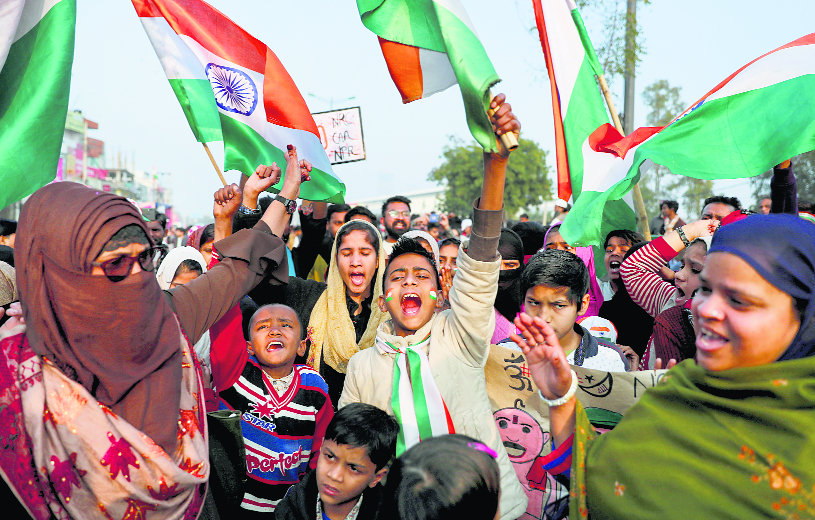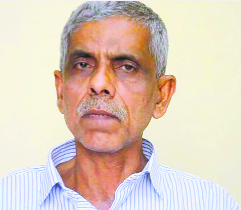
Sociologist
Anti-CAA protests, PM Modi said in Parliament, are taking the country on the ‘road to anarchy’. A statement of this kind need not surprise us because this discourse of ‘order’ vs ‘anarchy’ often emanates from those who remain blind to all alternative imaginations and dissenting voices. This is some sort
of ethical/intellectual dumbness implicit in the language of a non-dialogic/stubborn ruling regime.
For evolving a profound art of debunking Modi’s negative notion of ‘anarchy’, let us remind ourselves of two significant points. First, the order or normalcy the ruling regime seeks to impose on us is inherently problematic. It has to be understood that the ‘order’, the ideology of toxic nationalism — a project of militant Hindutva — generates is superficial. It is based on fear; it is devoid of the religiosity of love and empathy; it is not easy with the naturalness of heterogeneity and pluralism; and it is bound to suspect, humiliate and punish the ‘other’ of this monolithic/militaristic notion of order.
This ‘order’ has no inherent beauty: the way a tree has its beauty, despite the fact that every leaf that constitutes it as a ‘whole’ is somehow unique. Instead, it confuses uniformity with unity, fear with consent, majoritarianism with nationalism, hatred with religion, militarism with virtue, and narcissism with truth. It is, therefore, not surprising that for its existence and legitimacy, it needs to invent the ‘enemy’ all the time. Apart from Pakistan and the religious minorities, there are JNU/Jamia students, urban Naxals, dadis of Shaheen Bagh, leftists and Gandhians. These ‘conspirators’ — as the discourse of the establishment is disseminated through its propaganda machinery, or the highly aggressive language of its hyper-masculine saviours — are seen as anarchists who need to be shown their place through the epidemic of sedition charges, or other punitive measures. Here is a notion of order that has no spirit of positivity; it rests on hatred. No wonder, it needs the likes of Yogi Adityanath who sees nothing but anti-national conspiracy and biryani at Shaheen Bagh.
Second, the order that the ruling establishment imposes is incapable of comprehending the meaning of conflict. In fact, the ideology of the status quo always prefers to see conflict as some sort of nuisance — a ‘law and order’ problem. As it seeks to hide our attention from the real contradictions, it refuses to accept that there are intense moments when the creative dynamism of conflict acts as the driving force for the movement of history. For instance, a deeper understanding of anti-CAA protests all over the country suggests that beneath this struggle lies a longing for deep humanistic values that do not discriminate people on the basis of religion; or there is a quest for yet another imagination of India — secular, pluralist and non-discriminatory.
However, Shaheen Bagh, for the ruling regime, has to be seen as a conspiracy against the state. Or, it has to be projected as some sort of ‘nuisance’ because it blocks the road, and causes difficulties to the commuters. Or for that matter, if young students protest against the onslaught on public universities, they have to be projected as anarchists who constitute what the ‘patriotic’ news channels regard as the tukde-tukde gang.
Moreover, Modi needs to be told that ‘anarchy’ is not always a bad idea. As great visionaries have always reminded us, the real spirit of order emanates from ‘gentle anarchy’. This means two things. First, no relationship is possible without freedom; in fact, freedom is the art of relatedness; or freedom is the meaning of engaged responsibility. Otherwise, the order we would create is bound to be a doctrine of dull uniformity: a militaristic/nationalist project that tries to transform people into non-thinking ‘loyal soldiers’ of the ‘nation’.
The spirit of lyrical order is not in tune with this sort of toxic nationalism; instead, it nurtures free subjects, plurality of visions, and a spectrum of cultural traits; and togetherness emanates from the spirit of understanding and ethics of care. Don’t forget that it was the reason that led a poet like Tagore to critique the harshness of militaristic nationalism. ‘Order’ without freedom and elasticity of consciousness is what totalitarian fascism is all about.
Second, the positive/therapeutic spirit of ‘anarchy’ inspires one to resist against the danger of the all-powerful state, with excessive bureaucratisation, centralisation and militarisation. The fact is that one’s ‘anarchic’ spirit is a reminder of freedom — the freedom to realise that the creativity of human souls should not be allowed to be crushed by a gigantic machine. Modi should know that Gandhi (recall the impact of the likes of Ruskin and Thoreau on him) was also a gentle anarchist. His celebration of swaraj was the affirmation of people’s politico-ethical and economic power rather than the celebration of the mighty state.
And, as the Gandhian moment indicated, the ‘anarchy’ led to a new art of resistance filled with the power of love and ethical responsibility. The meaning of ‘non-cooperation’ nurtured by satyagraha is to renew one’s spirit of freedom to resist what is oppressive and unethical. Hence, the spirit of Gandhian ‘anarchy’, far from being negative, was a move towards a true community of ethically empowered/self-reflexive subjects. For the British empire, Gandhi was a nuisance — the way, for the present regime, all protesters, despite their largely non-violent modes of resistance, are problematic ‘anarchists’.
Possibly, a liberating idea of India would emanate from what Modi fears as ‘anarchy’. Beyond toxic nationalism and militarism, and beyond totalitarianism and despiritualised religion as a mass psychology of hatred — the emergent culture of protest, let us hope, would strive for India as an amazing civilisation that loves to sing in tune with diverse and multiple ragas with a musical symmetry: Lokayata and Vedanta, Guru Nanak and Kabir, Nizamuddin Auliya and Mother Teresa, and Gandhi and Bhagat Singh.
Join Whatsapp Channel of The Tribune for latest updates.




























